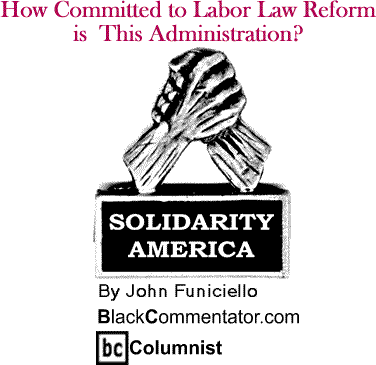
|
|||||||||||||||||||||||

|
|

Custom Search
|
|
 |
|
The Employee Free Choice Act (EFCA) is arguably one of the most significant pieces of labor legislation to benefit American workers that has been proposed in about three generations.
The proposal is that important - 60 years and counting since many of the rights of workers were taken from them by Taft-Hartley. On
June 27, new Secretary of Labor, Hilda Solis, addressed the graduates
of the While it’s true that her speech was not long, one would have thought she at least would have mentioned EFCA. It’s the bill that would allow workers to organize their place of employment by a simple majority of the workers in the bargaining unit signing up to join. The short name is “card check” and that pair of words sends chills of fear running up the backs of corporate CEOs, who believe that their tens of millions in salaries, benefits, perquisites, stock options, and golden parachutes will be threatened if workers made decent wages, had health care through insurance, and a retirement that did not require them to live in poverty. Secretary Solis came to the job with good trade union credentials. Her father was a member of the Teamsters union and worked in a battery recycling plant. Her mother worked in a toy factory and was a member of the Steelworkers’ union. They joined their respective unions, she told the graduates, “to ensure they received a fair wage and good benefits, that their workplace was safe, that they were paid the overtime they earned, and that they could retire with dignity.” And, there is no doubt, she added, that “unionized workers are more knowledgeable and more empowered than those who are not able to organize.” The secretary told the graduates that they were going out from the unique institution to which they had been attached for several years into difficult economic times, with the unemployment rate approaching 10 percent and six million unemployed. In what she termed “underrepresented” communities, the unemployment rate is even higher - 11.3 percent among Latinos and 15 percent among African-Americans. Among youth, the rate is 22 percent. These, of course, are only the official statistics, which don’t count those who are not seeking work. The number of such workers since the days of the Great Communicator - the early 1980s forward - is not known. Workplace safety and health, wage and hour law enforcement, and job creation are on her to-do list and are priorities for the administration, she told the graduates. Regarding
the enforcement of the nation’s labor laws, Secretary Solis assured
the class of 2009: She said also that she intends to “strengthen collective bargaining,” which was the closest she came to mentioning union organizing and negotiating contracts. By way of example of the strength of workers (or lack thereof) on the job, there was a devastating fire in a chicken plant in Hamlet, N.C., in 1991, that killed 25 workers and injured at least 49 others. The violations were so egregious that the owner of the plant was sentenced to 20 years in prison, as part of a plea bargain so that his son would not go to jail. However, justice being what it is, he was released after about four years. By the time of the Hamlet crimes, the country had seen the beginning of one of the more vicious periods of anti-union activity in the modern era, starting with the presidency of Ronald Reagan, and that period continues today. It was calculated that, if the Hamlet workers had waited for a government inspector of some kind to point out and correct the violations at the Imperial plant, they would have had to wait some 80 years. If there was some hard news - even a small amount - in the secretary’s speech, it was that the U.S. Labor Department is going to hire nearly 670 investigators, inspectors, and other program staff to carry on the mission of the department.
Promises do not protect workers. Workers protect workers, as they protect each other under the umbrella of a union contract, negotiated by workers from the local shop. But, to get the protection that a contract represents, there must be good, strong protective laws at all levels of government and they must be enforced. That, Secretary Solis has said she will do, but when she spoke to the graduates of the National Labor College - people who likely will do the work of the union movement for the rest of their lives - she had to know that their concern was for their right to freely organize, as simply and directly as possible. That’s what EFCA does. That she did not mention the bill that is in trouble in the Senate does not bode well for its passage or that it will even get to President Obama’s desk. The administration is going to have to push it for the bill to pass in the Senate. The
question is not whether Obama likes the idea of card-check, but
how hard is he going to fight for it, when he’s faced with so many
other monumental issues like single-payer health care, a growing
military and defense budget, and an expanding war in
Someone in the administration should be speaking out about EFCA, and if it isn’t Solis, who should it be? Otherwise, it could be another two generations - like single-payer health care - before the opportunity arises once again to do right by the rank-and-file of Americans. Both the president and the labor secretary should act as if card-check is right there, in the middle of the street. They need to “get off the sidewalk!” BlackCommentator.com Columnist, John Funiciello, is a labor organizer and former union organizer.
His union work started when he became a local president of The Newspaper
Guild in the early 1970s. He was a reporter for 14 years for newspapers
in |
|
Any BlackCommentator.com article may be re-printed so long as it is re-printed in its entirety and full credit given to the author and www.BlackCommentator.com. If the re-print is on the Internet we additionally request a link back to the original piece on our Website. Your comments are always welcome. eMail re-print notice
If you send us an eMail message we may publish all or part of it, unless you tell us it is not for publication. You may also request that we withhold your name. Thank you very much for your readership. |
|
| |
|
| July
9, 2009 Issue 332 |
|
| Executive Editor: Bill Fletcher, Jr. |
| Managing Editor: Nancy Littlefield |
| Publisher: Peter Gamble |
| Est. April 5, 2002 |
Printer Friendly Version
in resizeable plain
text format or pdf
format. |
| Frequently Asked Questions |
 |

|
 |
 |
 |
| |
| |





























 “Let
me be very clear on this issue……the Labor Department is back in
the enforcement business.”
“Let
me be very clear on this issue……the Labor Department is back in
the enforcement business.” Promises
of governments and administrations can go awry in an instant. The
only real protection in the workplace - health and safety, wage
and hour, grievance settlement and arbitration, collective bargaining...all
of workers’ issues - is an organization of the workers, themselves.
In other words, a union.
Promises
of governments and administrations can go awry in an instant. The
only real protection in the workplace - health and safety, wage
and hour, grievance settlement and arbitration, collective bargaining...all
of workers’ issues - is an organization of the workers, themselves.
In other words, a union.





